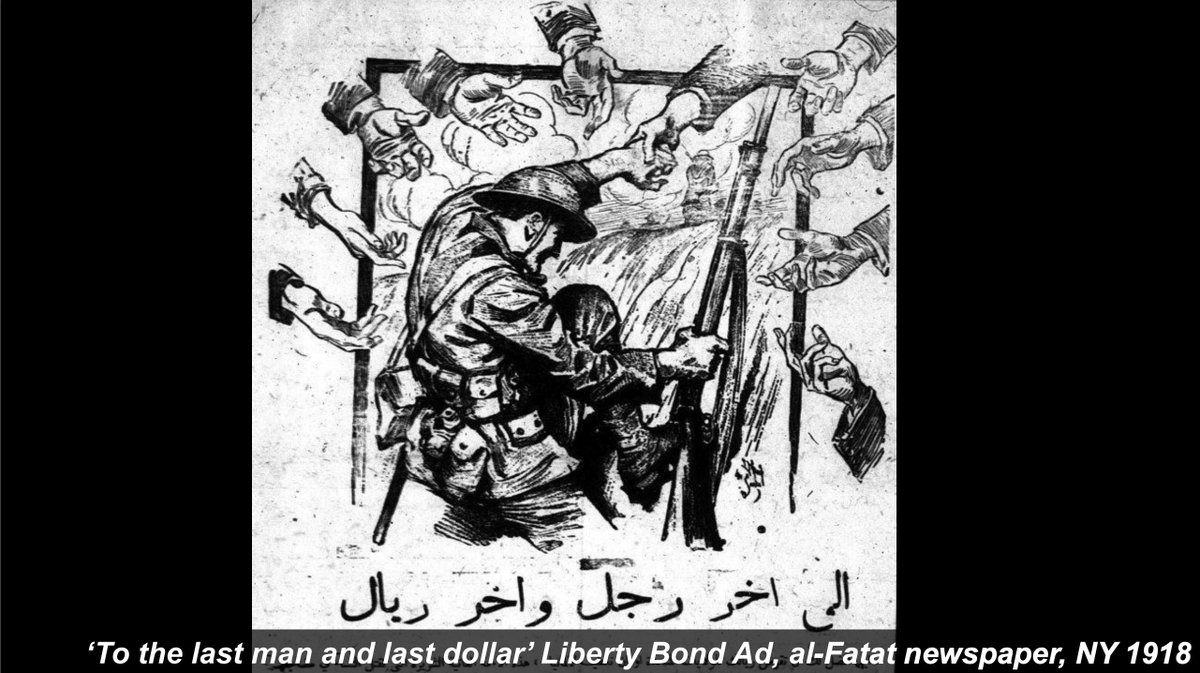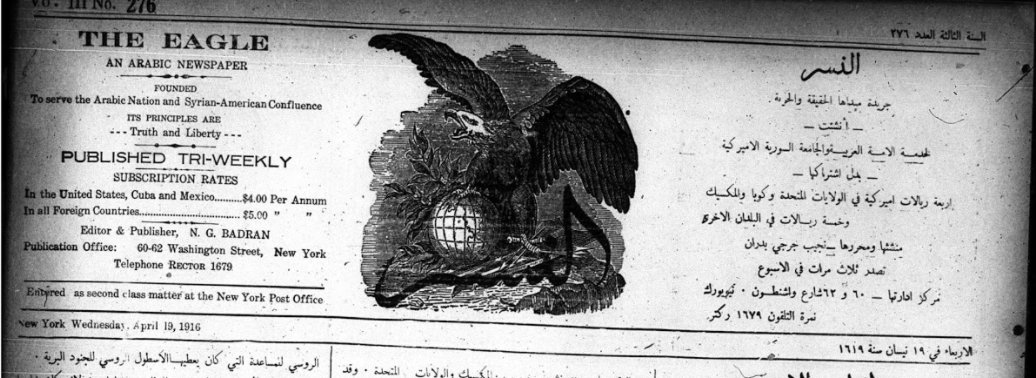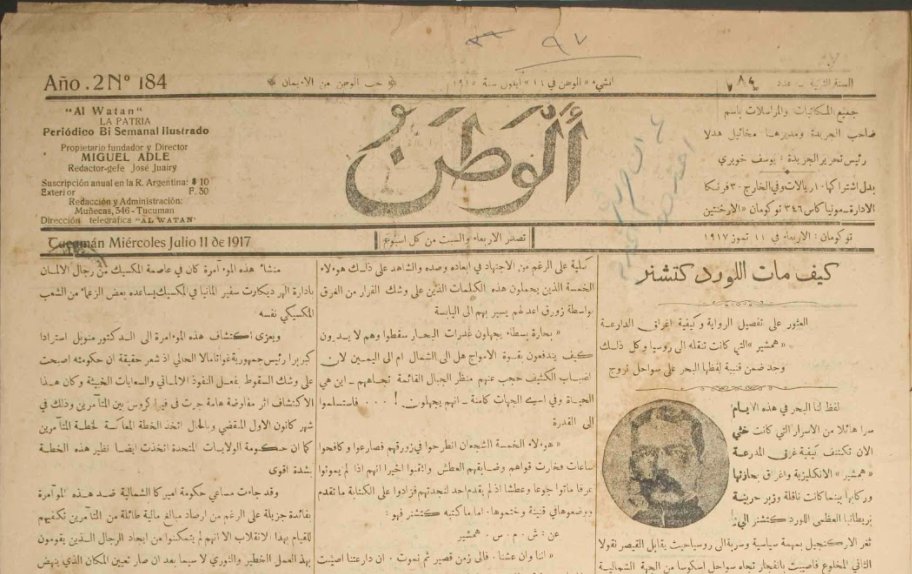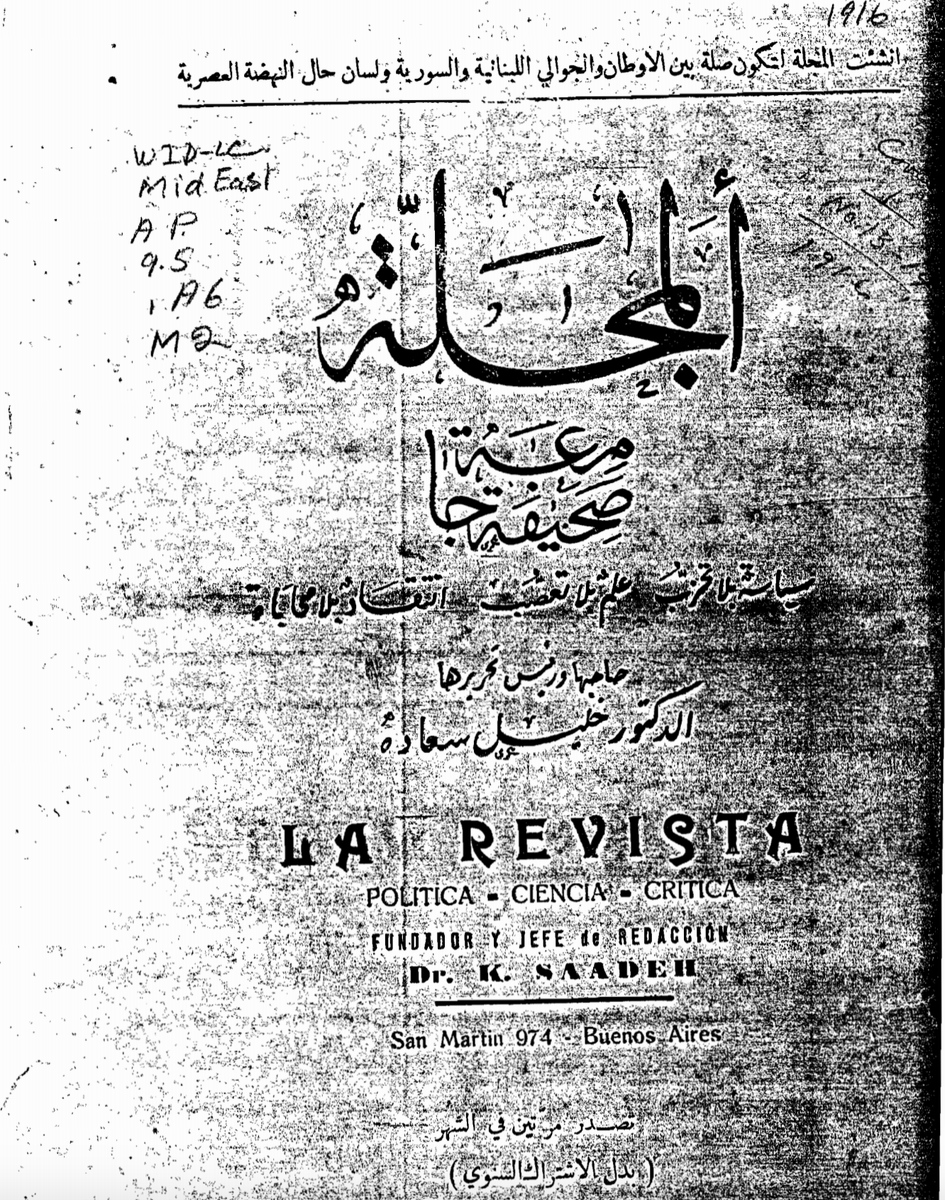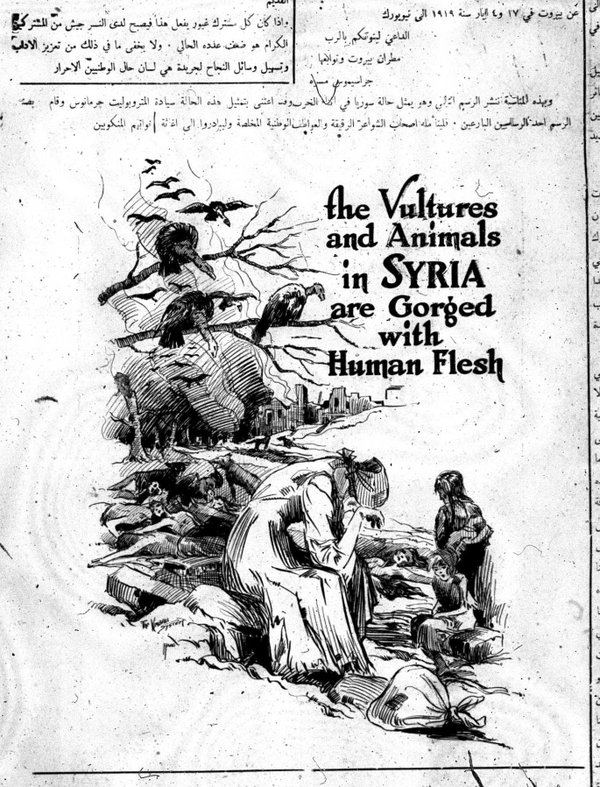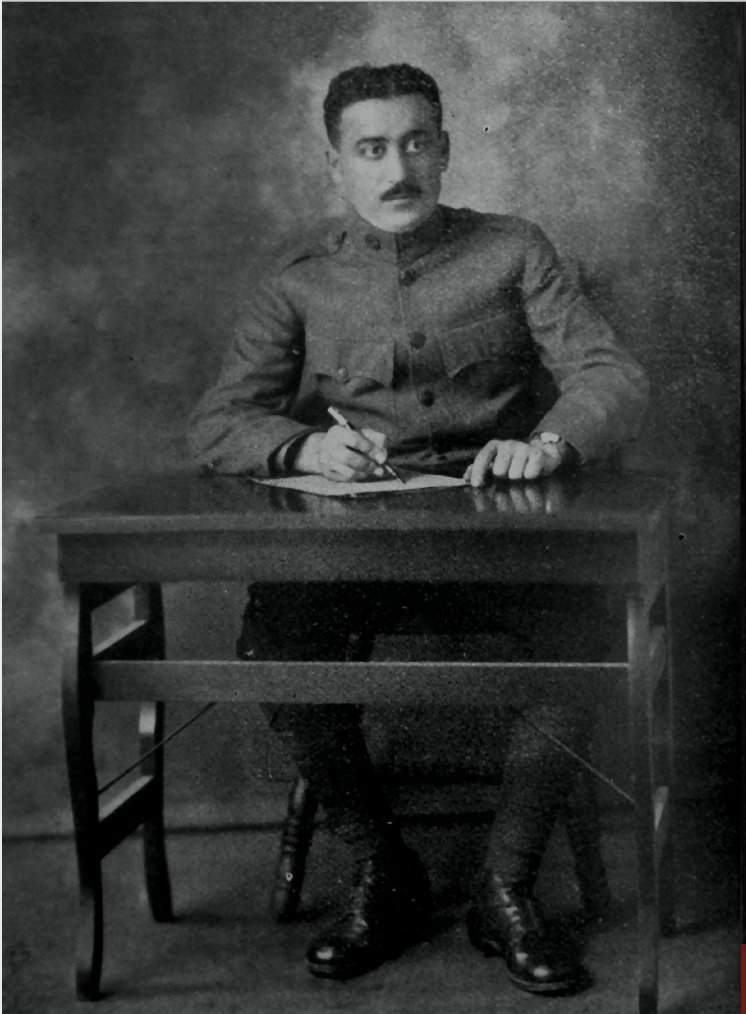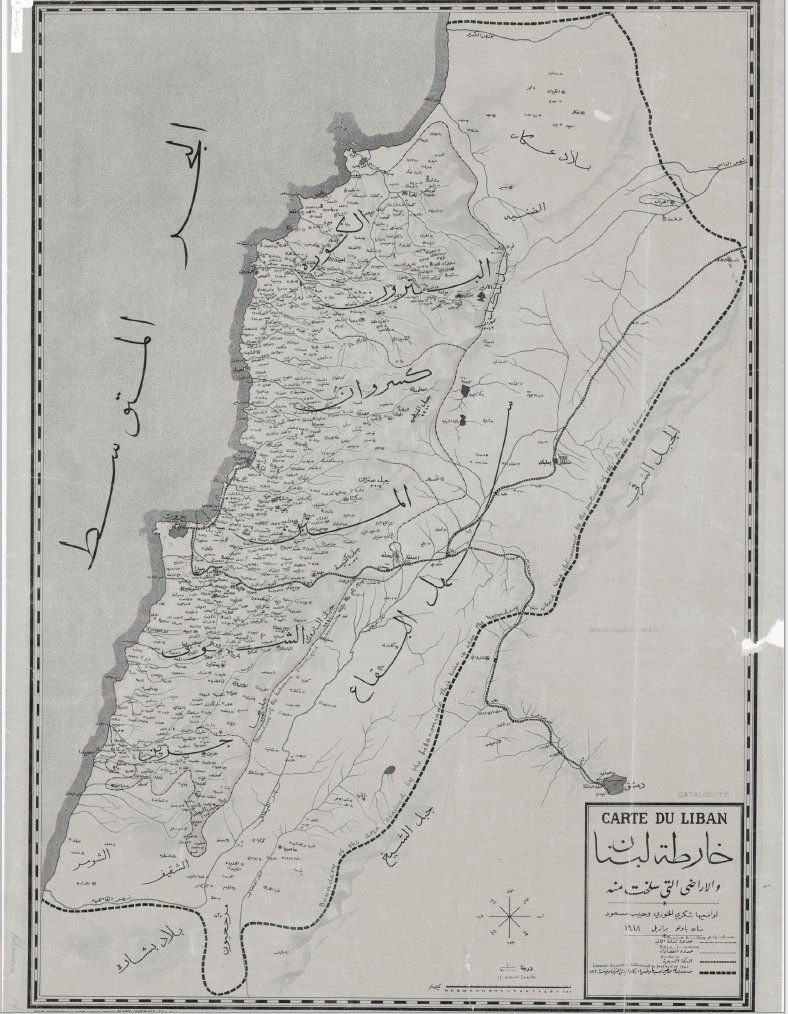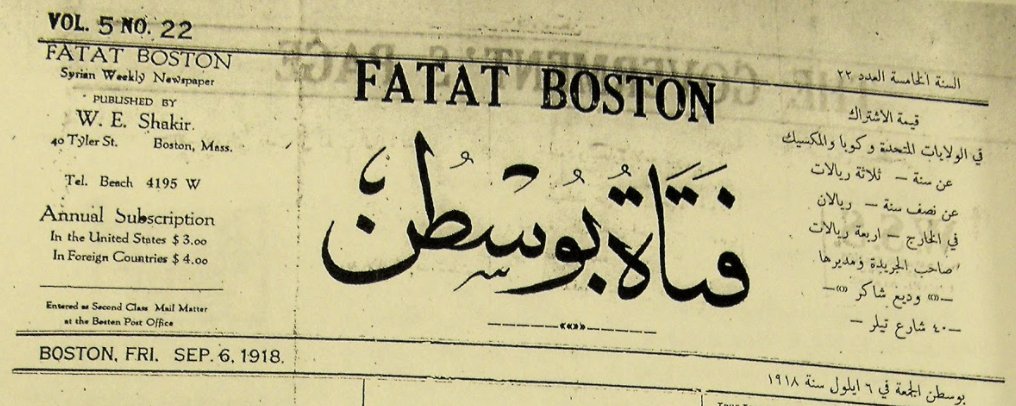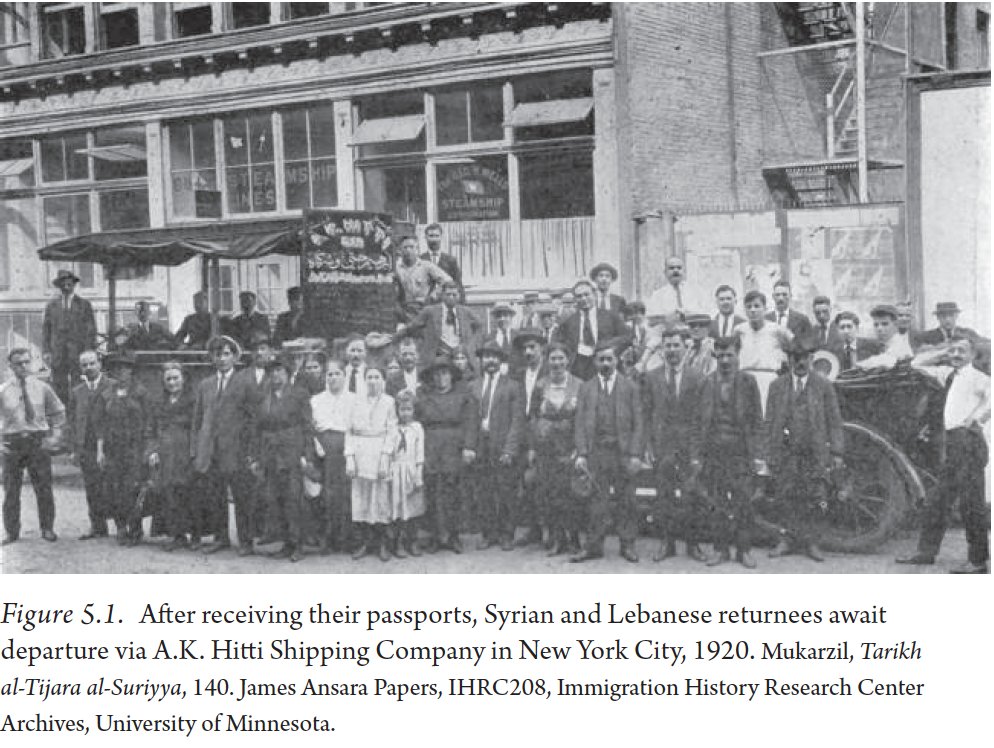WORLD WAR I IN THE MAHJAR special feature: Military mobilization in the mahjar.
During the First World War, some 10,000 Syrian, Lebanese, Palestinian men from the Americas joined one of the armies of the Entente Powers.
Some fought against the Ottomans. I& #39;ll explore that here.
During the First World War, some 10,000 Syrian, Lebanese, Palestinian men from the Americas joined one of the armies of the Entente Powers.
Some fought against the Ottomans. I& #39;ll explore that here.
The war& #39;s first year was devastating for Syrians in the Ottoman Empire. Food shortages, mass conscription, profiteering, censorship/surveillance of public speech. Censorship orders essentially killed the private press, leaving only its mahjari counterpart intact.
Food shortages, Ottoman requisitioning policies, an Allied naval blockade, and a locust plague tipped the region into famine by 1916. Lebanon was particularly devastated. Read more on the mahjar& #39;s famine relief efforts in this piece by
@graham_a_pitts:
https://lebanesestudies.news.chass.ncsu.edu/2016/10/26/for-gods-sake-send-me-ten-lira-women-migration-and-world-war-i-in-mount-lebanon/">https://lebanesestudies.news.chass.ncsu.edu/2016/10/2...
@graham_a_pitts:
https://lebanesestudies.news.chass.ncsu.edu/2016/10/26/for-gods-sake-send-me-ten-lira-women-migration-and-world-war-i-in-mount-lebanon/">https://lebanesestudies.news.chass.ncsu.edu/2016/10/2...
In 1915-16, Ottoman governor Cemal Pasha ordered hanged dozens of Syrian journalists/editors in public spectacles in Beirut and Damascus. The hanged were mentioned in documents seized from Beirut& #39;s French consulate.
This puts Arslan& #39;s refusal to turn over the Ottoman Empire& #39;s Buenos Aires consulate& #39;s records in a new light.
Arslan feared that records seized from his office could lead to the political prosecution and hanging of more Syrian public men. https://twitter.com/Tweetistorian/status/1280923167393902592">https://twitter.com/Tweetisto...
Arslan feared that records seized from his office could lead to the political prosecution and hanging of more Syrian public men. https://twitter.com/Tweetistorian/status/1280923167393902592">https://twitter.com/Tweetisto...
The serials of the mahjar decried hangings, conscription policies, the censorship, and Ottoman mismanagement in Syria. Some called for independence from Istanbul.
Because they were printed beyond Ottoman shores, the state couldn& #39;t repress this press. A resistance formed.
Because they were printed beyond Ottoman shores, the state couldn& #39;t repress this press. A resistance formed.
By 1916, some of the Syrian committees attached to these serials/reading rooms began to approach the consulates of the Entente Powers, to offer assistance in the war effort.
Syrians abroad got invested in humanitarian aid/famine relief, but also into military mobilization.
Syrians abroad got invested in humanitarian aid/famine relief, but also into military mobilization.
Syrian clubs raised funds for the Red Cross and other US channels (the committee for near east relief, etc). They also published War Dept ads for relief work, war bonds, and pro-Entente propaganda generally.
Here& #39;s one memorable relief work ad from 1917 (from Fatat Boston):
Here& #39;s one memorable relief work ad from 1917 (from Fatat Boston):
A few editors of mahjari serials themselves enlisted in the armed force.
Remember Shurki al-Bakhkhash? We spoke about him here: https://twitter.com/Tweetistorian/status/1280554423912030208
Here">https://twitter.com/Tweetisto... he is in 1917, a US Army propagandist. He produced most of the pro-US propaganda that appeared in Arabic during the war.
Remember Shurki al-Bakhkhash? We spoke about him here: https://twitter.com/Tweetistorian/status/1280554423912030208
Here">https://twitter.com/Tweetisto... he is in 1917, a US Army propagandist. He produced most of the pro-US propaganda that appeared in Arabic during the war.
By late 1916, Syrian and Lebanese pro-independence societies lobbied the Entente powers for the right to enlist Arab immigrants into the army. These parties specifically wanted Arabs from the mahjar to campaign against the Ottomans directly.
The French were the first to agree.
The French were the first to agree.
Working with Syrian parties to recruit young Arab men from the mahjar, the French created an "Eastern Legion" (Legion d& #39;Orient) to allow Syrians, Lebanese, Armenians to bring the fight to the Ottomans.
Here& #39;s a São Paulo recruitment event. French consul Paul Claudel at center.
Here& #39;s a São Paulo recruitment event. French consul Paul Claudel at center.
The Eastern Legion recruitment was meagre: Simon Jackson describes a mere 500 Arab recruits in what was a basically Armenian force, deployed to Palestine.
But when the USA entered the war in 1917, Syrian committees in New York City saw an opportunity for broader Arab enlistment.
But when the USA entered the war in 1917, Syrian committees in New York City saw an opportunity for broader Arab enlistment.
The US Army was hesitant to allow enlistment of Arab men of Ottoman nationality. Ethnic clubs like the Lebanese League of Progress lobbied for a new legal category separating "Syrians and Mount Lebanese claimed by Turkey" from other Ottoman nationals, enabling their enlistment.
The first Army recruiters were second-generation Arab Americans, men born in the mahjar and who grew up as birthright citizens.
Here& #39;s Albert Hatem, nephew of Lebanon League of Progress secretary Na& #39;um Hatem. A US army recruiter until his deployment to France in 1918.
Here& #39;s Albert Hatem, nephew of Lebanon League of Progress secretary Na& #39;um Hatem. A US army recruiter until his deployment to France in 1918.
But in addition to men like Hatem recruiting for the Army, the Syrian clubs managed significant, transnational networks of military recruitment.
Men like Shukri al-Bakhkhash, Na& #39;um Mukarzil, Amin Arslan all participated in military recruitment for US, French, & Canadian units.
Men like Shukri al-Bakhkhash, Na& #39;um Mukarzil, Amin Arslan all participated in military recruitment for US, French, & Canadian units.
These Syrian societies also articulated and clarified new nationalist ideologies, rooted in their desires for an independent, post-Ottoman homeland.
Arabist, Syrianist, and Lebanist visions of a postwar Middle East vied with one another in the press.
Arabist, Syrianist, and Lebanist visions of a postwar Middle East vied with one another in the press.
To show a single tendency: it was in this moment that the Lebanon League of Progress (Jam& #39;iyyat al-Nahda al-Lubnaniyya) produced/circulated maps like this, depicting their vision for a greater Lebanese state independent to both the Ottoman Empire and its Syrian hinterland.
What does this have to do with enlistment?
Well, the French campaign was centered on French desires to assert tutelage on the region, including the possibility for a Lebanese state.
Lebanists supported French enlistment. Arab nationalists and Syrianists supported US enlistment.
Well, the French campaign was centered on French desires to assert tutelage on the region, including the possibility for a Lebanese state.
Lebanists supported French enlistment. Arab nationalists and Syrianists supported US enlistment.
Enlistment was a space for contest between competing cells of nationalists. The arrival of recruiters in Syrian colonies set off waves of political violence, strings of arsons, and reprisals. One meeting in Rosario, Argentina led to a brawl that killed 1 and hospitalized 12 more.
Both in NYC, Shukri al-Bakhkhash and Na& #39;um Mukarzil lobbed accusations at one another to sabotage their respective recruitment campaigns.
Both men (and prominent colleagues like Ilya Abu Madi) spent time under indictment for sedition because of these kinds of reprisals.
Both men (and prominent colleagues like Ilya Abu Madi) spent time under indictment for sedition because of these kinds of reprisals.
Whether recruiting for the French or the US, in service to a free Syria, free Lebanon, or Hashimite Arab nationalism, all of the mahjari political clubs described enlistment as part of Syria& #39;s emancipation from the "Turkish yoke" (nir al-atrak).
1917 Arab nationalist editorial:
1917 Arab nationalist editorial:
However, even as the mahjari serials and nationalist clubs were eager to claim Arab fighters for their respective movements... not every enlistee was happy about being claimed.
Meet George Matook (Jurj Ma& #39;tuq) from Boston, MA.
Meet George Matook (Jurj Ma& #39;tuq) from Boston, MA.
Matook was a second-generation Arab American who grew up in Lowell MA, and worked in the heavy industries before enlisting with the Army. He was connected to the Syrian American Club of Boston, a club engaged in both immigrant mutual aid and homeland nationalist politics.
Arab American troops in the US Army were routinely deployed to the French Western Front. It was the only theater of war Provost Marshall Enoch Crowder would consider for Middle Eastern ethnics.
That& #39;s where George Matook ended up in 1918.
That& #39;s where George Matook ended up in 1918.
Matook maintained a correspondence with the Syrian American Club of Boston from abroad. One of the club& #39;s directors, Wadie& #39; Shakir, was also then editor of Fatat Boston, pictured here.
Shakir published a portion of Matook& #39;s letters in the serial, alongside an editorial...
Shakir published a portion of Matook& #39;s letters in the serial, alongside an editorial...
Shakir& #39;s editorial lauded the courage of Syrian troops at the front, reproducing some of the staple narratives of the mahjar& #39;s enlistment campaigns: Syrians were liberating the homeland (watan), opposing a brutal Turkish state, and theirs was a heroic mission.
(p81 of my book):
(p81 of my book):
Outraged by how Fatat Boston had claimed Syrian soldiers as their heroes, Matook wrote a letter criticizing the Syrian American Club and nationalist committees.
The letter sits in the @ArabAmericanMus, but parts of it are digitized: http://sourcebook.cegcproject.eu/items/show/207?query=Arab%20American
Here& #39;s">https://sourcebook.cegcproject.eu/items/sho... a clip:
The letter sits in the @ArabAmericanMus, but parts of it are digitized: http://sourcebook.cegcproject.eu/items/show/207?query=Arab%20American
Here& #39;s">https://sourcebook.cegcproject.eu/items/sho... a clip:
In the end, the First World War ended in an Ottoman defeat and retreat from Syria in October 1918.
Syrian troops from the mahjar mostly returned to the diaspora. Some achieved citizenship in their countries of domicile.
Others had only Ottoman nationality, now mooted by the war
Syrian troops from the mahjar mostly returned to the diaspora. Some achieved citizenship in their countries of domicile.
Others had only Ottoman nationality, now mooted by the war
To read more about military recruitment in the Syrian mahjar, check out this article on the topic via @humcommons : https://hcommons.org/deposits/item/hc:15329/
Some">https://hcommons.org/deposits/... of this thread& #39;s material comes from it.
Some">https://hcommons.org/deposits/... of this thread& #39;s material comes from it.

 Read on Twitter
Read on Twitter